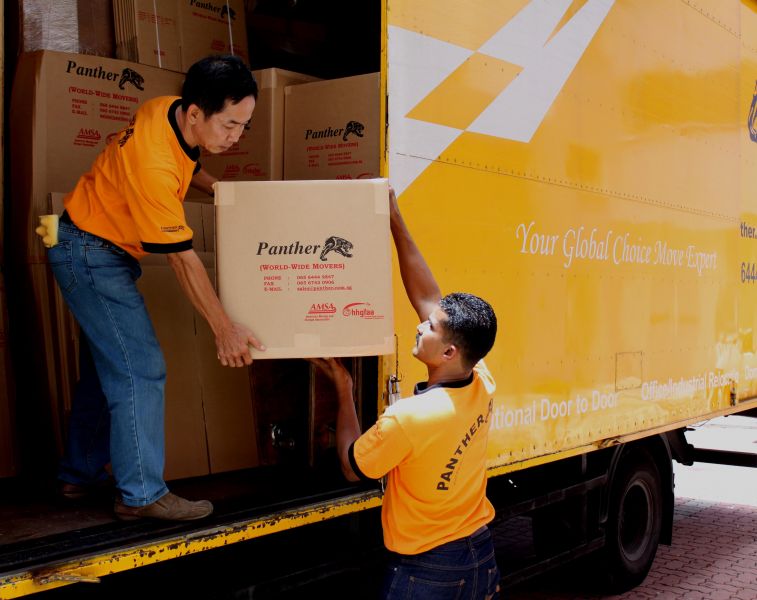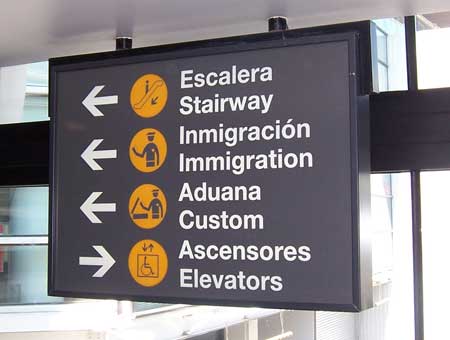Freight from the USA
|
|
|
|||
If you are a first-time international shipper, we recommend starting with this article about shipping household goods from the USA.
Shipping household goods from the US means global cargo transportation for non-commercial purposes.
Less-than-Container Load (LCL) freight is a cost-effective international shipping option. It's ideal for moving overseas relatively large loads that don't fill an entire sea container. With LCL, shippers share the container with others and only pay only for the space they occupy in the container.
Yes, it is possible to ship household goods and personal belongings using Less-than-container load.
However, it is essential to note that this is not the same as sending cartons with a parcel service or hiring an international moving company to ship household goods overseas.


For small shipments, such as a few microway-box-sized packages weighing up to 50kg (110 lbs), standard parcel carriers (USPS, FedEx, DHL) are typically the most suitable options. These services are perfect for gifts, samples, or small retail orders.
LCL comes once your shipment grows to about the size of a washing machine (~1 cubic meter) or reaches 100kg (220 lbs). LCL (Less-than-container load) becomes a cost-effective way to ship overseas. This method shares container space with other shippers. But remember two important LCL realities:
Minimum charge: LCL rates are generally calculated based on the volume rather than their weight. The volume is calculated in cubic meters or cubic feet. This short video on YouTube should help you figure out how big a cubic meter is.
With LCL, the minimum charge is always one cubic meter (35 cubic feet). This means that even if you ship cargo with an overall volume of less than one cubic meter, you will still be charged for one cubic meter.
For example, let's say the LCL freight rate from New York to London, UK, is $47 per cubic meter w/m with a minimum charge of $47. Even if the volume of a load is less than one cubic meter, say 0.5 cubic meters, you'll still have to pay the minimum charge. Once your volume exceeds one CBM, multiply the rate by the volume. For example, 1.75 CBM X $47 = $82.25.
One cubic meter is quite a large volume. Shipping overseas a cargo of one cubic meter is equivalent to international shipping about 12 medium moving boxes, each measuring 18"x18"x16" (3 cubic feet each).
Destination charges: These are also referred to as "local charges" and apply at destinations. All imports, regardless of whether you ship overseas commercial commodities or personal items, are subject to local charges that are separate from freight charges and not included in the cost of transportation.
When sending a tiny parcel overseas as a gift, the recipient may not notice the charges, as they're already included in the international shipping cost. However, depending on the type and value of the goods and the destination country, the recipient may have to pay a fee to receive the parcel. We will discuss the charges below. Otherwise, follow this web link.
While international moving companies market themselves as the easiest solution for relocating personal belongings overseas, Less-than-Container-Load (LCL) provides better value, especially for smaller or partial household shipments where everything is boxed or crated and no assembled furniture is intended to be shipped.
Unlike international moving companies, which charge premium rates for full-service packing and handling, LCL allows you to ship only what you need at a fraction of the cost. You maintain control over packing quality and avoid paying for unnecessary services, making it ideal for budget-conscious individuals or those shipping overseas only selected items that can be boxed or crated.
A significant advantage of LCL is transparency in pricing. International movers often bundle costs into vague estimates, whereas LCL charges are based on precise cubic meter measurements. You won’t encounter surprise charges for "premium" services you didn’t request. LCL is always more economical than hiring movers for shipments that do not contain furniture or other large items that are difficult to pack and store on pallets.
Critics argue LCL requires more effort, but professional packing isn't necessary for non-fragile items like books, clothing, disassembled furniture, etc. It can be self-arranged, avoiding high job prices, as long as secure loading is ensured.
For those who don’t need full-service moving, LCL strikes the perfect balance: affordable, flexible, and surprisingly straightforward. By working with a freight forwarder and comparing LCL quotes to international mover estimates, you’ll often find that shipping household goods overseas via LCL is the smarter choice.
As a U.S. freight forwarder, AMID Logistics has supported international shipping of personal belongings from the United States for 20 years. Our customers are happy with our service and refer us to others. You may want to read our customer reviews.
We wrote an article about transporting cargo containing personal items from the U.S. overseas. Please read this article. It should take approximately half an hour to review it. However, once you've finished reading, you'll be prepared to ship your belongings from the US, regardless of which international shipping company you choose.
It is essential to understand that when transporting directly with an ocean carrier, all items must be packed appropriately for transportation. Unlike with an international moving company, with a global transportation company (such as a freight forwarder or NVOCC), the shipper is responsible for packing the cargo.
If marine insurance is requested, the shipper should understand the liability of the sea carriers and how insurance policies apply to items that are not professionally packed.
Additionally, when packing items for international shipping, be aware of the wood-packing restrictions that apply to global cargo transportation from the United States and worldwide. The regulations commonly referred to as ISPM 15 are also known as International Standards for Phytosanitary Measures No. 15. If you ship to Oceania, primarily to Australia or New Zealand, it is crucial to pay special attention to cargo fumigation, also known as BSMB (Brown Marmorated Stink Bug spread prevention).
Once again, please read this article to prepare for the venture, regardless of which international shipping company you choose to use. You can watch the short video on YouTube about shipping household goods from the U.S. overseas using LCL freight.
No matter how you transport, whether through an international moving company, LCL freight, or in the trunk of your car crossing the border, destination charges (sometimes called local charges) will always arise when you cross the destination country's border.

Importing personal and household items from the US to most countries usually incurs little or no customs duty. However, ensuring that the items conform to the country's import regulations is essential, a process that can be complex.
Before scheduling a shipment,
However, always remember that when exporting from the USA to other countries, customs duty is just a part of the local charges that occur when entering those countries' commerce zones. You can find details about destination charges for global cargo transportation from the USA on our website's FAQ section or by reading the article.
Unaccompanied baggage refers to conveying a portion of luggage separately from the passenger. This separate shipment is necessary because it contains items that must be used immediately upon arrival overseas. While traveling, some of your belongings will follow you.
The LCL can be utilized for unaccompanied baggage. Import recoveries that fall under this category tend to be less complicated and more cost-effective in terms of customs procedures in the destination countries.
At AMID Logistics, you can obtain an instant price quote with our online freight calculator and arrange unaccompanied baggage as LCL before your departure overseas.

Regardless of the mode of transportation, when entering a new country, any unaccompanied luggage must be declared at the border. This can be done by filling out a customs declaration form at a customs window.
Find out in advance what customs form is appropriate in your country. For example, in the U.S., it is Form 3299 - Declaration of Free Entry of Unaccompanied Articles. The declaration clearly states that your unaccompanied baggage will follow you by sea.
If you choose to ship unaccompanied baggage from the USA, you will always be required to provide a detailed Valued Packing List, the document that lists the shipped items and assigns their value. At AMID Logistics, we make it easy for you to submit this essential document online. Attach a copy of your Valued Packing List. Include critical information about your sea freight shipment on your Dock Receipt, such as the ocean freight carrier's booking number, origin, destination, vessel, voyage, etc. It is advisable to keep a copy of the declaration and use it when going through customs for your unaccompanied baggage in the destination country.

Suppose you plan to move overseas and ship your belongings to be picked up at the destination.
When booking your shipment and submitting documents, it is essential to follow the "Cosigner = Consignee" rule: The consigner (the shipper) and the consignee (the cargo recipient) must have the same name, without any spelling variations. While you can provide different contact information for the notifying party on your ocean freight bill of lading, it is crucial that the full names of the consigner and consignee match.
Adhering to the "Cosigner = Consignee" rule can avoid potential problems when retrieving your import from customs. In other words, following this rule can save you both time and money by preventing the need for amendments to your ocean freight bill of lading.

*NO FOOD STUFF, WINE & DRUGS*. Exporting food, wine, drugs, and supplements is heavily regulated. Violations can result in cargo detention, fines, and criminal charges. The shipper/consignee is responsible for providing the necessary documents and permits. Any costs arising from violations of these regulations are the responsibility of the shipper or consignee.
Do not include food, vegetables, wine, drugs, or animal products. Even a tiny portion can cause significant issues during departure or upon arrival. Avoid adding such products for a hassle-free experience.
Extra documents, such as phytosanitary or veterinary certificates, may be needed to ship cargo containing vegetables or animal products.
If you wish to ship such products overseas, please get in touch with the consulate or embassy of the destination country in advance. Obtain information on the specific import regulations applicable to your shipment. Ensure you have all necessary documents and certificates.
Remember that international shipping of the products listed above may face delays or incur additional costs if proper documentation is not provided. It is essential to clarify that neither freight forwarders nor ocean freight carriers can be held responsible for such occurrences.
To simplify understanding, when packing belongings for delivery from the U.S. overseas LCL, do not include items that are prohibited at your local USPS post office. Stay away from adding to your shipment the following:
If you are not confident that some of your items are legal for international shipping from the USA abroad, do not put your entire shipment at risk. Leave it. Do not ship.
Animals and live plants from the U.S. are prohibited and will not be accepted for transportation unless there is no Special Commodities contract in place.
|
|